Hello there, fellow dog lovers! I’m Dr. Candy, your go-to holistic veterinarian. Today, let’s chat about our beloved Bedlington Terriers and a topic that often gets overlooked – dental health. You see, our furry friends’ oral hygiene is just as crucial as their overall health. In fact, they’re interconnected. Poor dental health can lead to a multitude of health issues, from heart disease to kidney problems.
Specifically, we’re going to focus on Bedlington Terrier Dental Health. This breed, known for its lamb-like appearance and playful nature, is also prone to certain dental issues. So, whether you’re a seasoned Bedlington Terrier parent or considering adopting one, this information is vital. We’ll discuss common dental health issues, conventional treatments, and my holistic approach to maintaining your Bedlington’s pearly whites. Plus, I’ll share my top recommended dental chews and products. So, let’s get started on this journey to ensure our Bedlington Terriers have the healthiest and happiest lives possible!
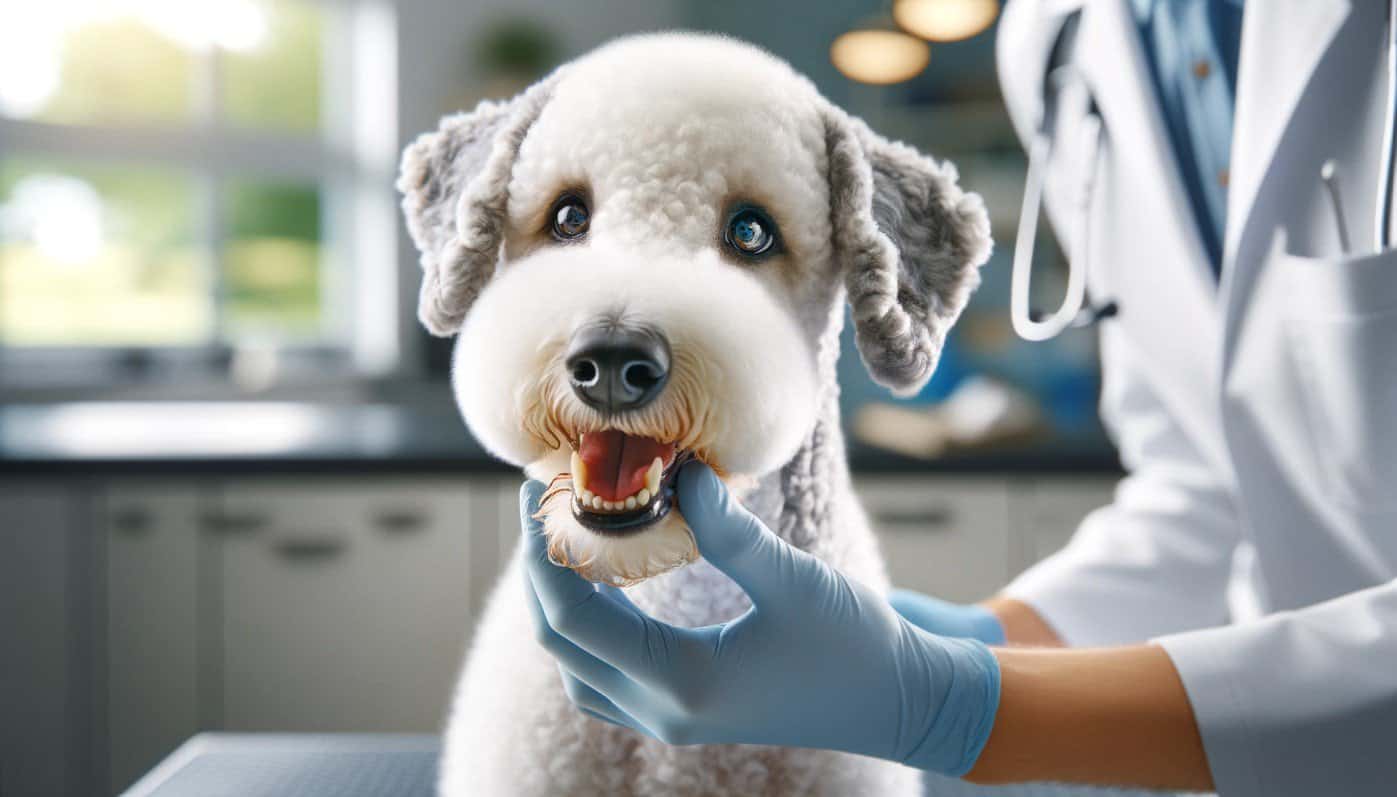
Signs of Dental Disease in Bedlington Terrier
As a dedicated Bedlington Terrier parent, you want your furry friend to be in the prime of health. An integral part of that is maintaining their Bedlington Terrier dental health. But how do you know if your dog is suffering from dental issues? Well, let’s delve into the signs of dental disease in your Bedlington Terrier.
Firstly, bad breath is a common sign of dental disease. If your Bedlington Terrier’s breath is consistently foul, there’s a good chance they have oral health issues. Contrary to popular belief, bad breath in dogs isn’t normal; it’s a telltale sign of an underlying problem.
Secondly, look at your dog’s teeth. If you spot yellow or brown discoloration, or a build-up of tartar along the gum line, it’s a clear indication of dental disease. While tartar may not seem harmful, it’s a breeding ground for bacteria that can lead to serious dental problems.
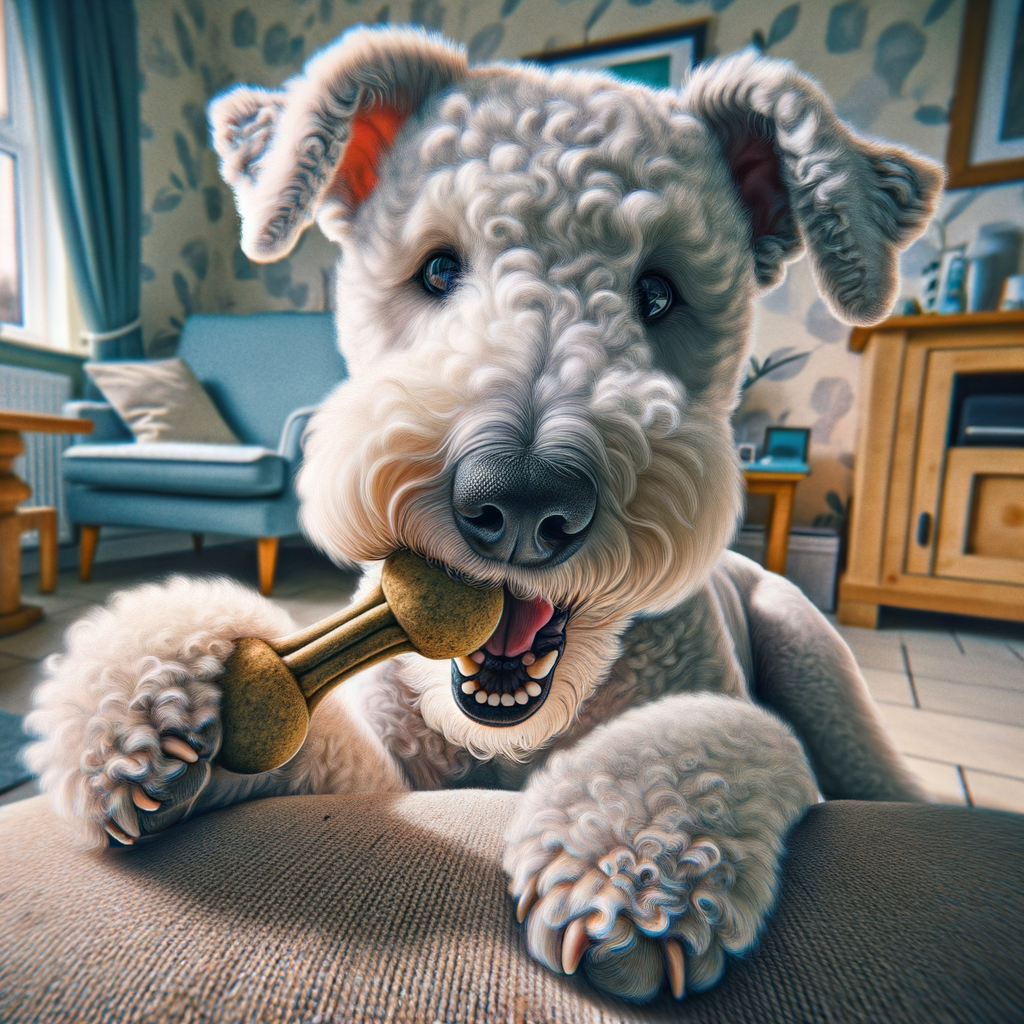
Additionally, pay attention to any changes in eating or chewing habits. If your Bedlington Terrier is eating less, dropping food while eating, or chewing only on one side, it could be due to oral discomfort. Similarly, excessive drooling or pawing at the mouth are also signs your dog might be in dental distress.
- Bad breath
- Discolored teeth or tartar build-up
- Changes in eating or chewing habits
- Excessive drooling
- Pawing at the mouth
Finally, observe your dog’s behavior. If they seem less active or more irritable than usual, it might be due to pain from dental disease. Remember, dogs are good at hiding pain, so any changes in behavior should be taken seriously.
It’s crucial to remember that dental disease in dogs is not just about bad breath and unsightly teeth. It can lead to severe health problems like heart, liver, and kidney diseases. Therefore, maintaining your Bedlington Terrier’s dental health is not just about keeping their smile bright; it’s about ensuring their overall well-being. So, keep a keen eye on these signs and take action at the earliest to keep your beloved Bedlington Terrier in the best of health.
Common Dental Health Issues In Bedlington Terrier
As a veterinarian, I often come across various Bedlington Terrier dental health issues. This breed, like many others, is susceptible to certain oral health problems. Understanding these can help you take the necessary steps to prevent them.
- Periodontal Disease: This is one of the most common dental issues in Bedlington Terriers. It begins with the build-up of plaque and tartar on the teeth, leading to gum inflammation (gingivitis). If left untreated, it can progress to periodontitis, causing tooth loss and potential damage to the heart, liver, and kidneys.
- Tooth Decay: Just like in humans, dogs can also suffer from cavities. Lack of proper oral hygiene and a diet high in sugars and carbohydrates can contribute to this problem.
- Broken Teeth: Bedlington Terriers are known for their playful nature. However, their love for chewing on hard objects can sometimes lead to broken or fractured teeth.
Proactive Bedlington Terrier teeth care is crucial to prevent these issues. Regular brushing, dental chews, and professional cleanings can go a long way in maintaining your dog’s oral health. Remember, a healthy mouth contributes to a healthy dog.
It’s worth noting that dog dental health issues can often go unnoticed as dogs are good at hiding pain. Therefore, regular vet check-ups are essential to catch any problems early. If you notice any changes in your dog’s eating habits, bad breath, or signs of discomfort, it’s time for a dental check-up.

Common Dental Treatments
When it comes to maintaining your Bedlington Terrier’s dental health, it’s essential to consider both preventive and corrective measures. Let’s discuss the conventional treatments that you can rely on.
Anesthetic Dental Cleanings
One popular and effective method for dental treatment in dogs is anesthetic dental cleanings. This procedure involves putting your Bedlington Terrier under general anesthesia so that a thorough examination and cleaning of the teeth can be performed. This is an excellent way to prevent and treat diseases such as periodontal disease and tooth decay. However, it’s important to note that this procedure should only be performed by a professional veterinarian or a veterinary dental specialist.
While anesthesia can pose some risks, the benefits of a thorough dental cleaning often outweigh these risks. However, you should discuss this with your vet, especially if your Bedlington Terrier has any individual health obstacles.
Potential Individual Health Obstacles
Every dog is unique, and your Bedlington Terrier may have specific health issues that could affect their dental care. For instance, this breed is known to have a propensity for heart problems, drug sensitivities, and seizures. These conditions may influence the decision to use anesthesia during dental cleanings.
Age is another factor to consider. If your Bedlington Terrier is of extreme age, the risks associated with anesthesia may increase. Therefore, it’s crucial to have a thorough discussion with your vet about the best dental health treatments for your furry friend, considering their overall health and age.
In conclusion, maintaining your Bedlington Terrier’s dental health is crucial for their overall well-being. Conventional treatments like anesthetic dental cleanings can be highly effective, but it’s essential to consider any individual health obstacles that your pet may have. Always consult with a professional veterinarian to ensure that you’re making the best decisions for your pet’s dental health.
As a dog parent, you’re always looking for the best ways to keep your Bedlington Terrier healthy and happy. When it comes to their dental health, it’s crucial to consider a holistic approach that goes beyond regular teeth brushing and dental chews. This is where Dr. Candy’s approach comes in, focusing on diet and oral health-specific probiotics.
Diet- Low Carbs, Avoid Added Sugars, Enzymes In Fresh Food
Firstly, let’s talk about diet. A healthy diet is the cornerstone of any pet’s wellbeing, and that includes Bedlington Terrier dental health. Here are some key points to remember:
- Low carbs: A diet low in carbohydrates can help reduce plaque buildup on your dog’s teeth, as bacteria in the mouth feed on carbs and produce plaque as a byproduct. This means feeding your Bedlington Terrier a diet rich in high-quality proteins and healthy fats.
- Avoid added sugars: Sugar is another food source for bacteria, leading to more plaque and tartar. Avoid feeding your dog foods with added sugars, including treats.
- Enzymes in fresh food: Fresh foods, especially raw or lightly cooked meats, contain natural enzymes that can help break down plaque on your dog’s teeth. Consider adding some fresh food to your Bedlington Terrier’s diet if you haven’t already.
Oral Health Specific Probiotics
Next, let’s look at probiotics. You’ve probably heard of probiotics for gut health, but did you know they can also support oral health?
Oral health-specific probiotics, like Probiora for Dogs, introduce beneficial bacteria into your dog’s mouth. These good bacteria can help crowd out harmful bacteria, reducing plaque and improving breath. Plus, they’re easy to use – simply sprinkle the probiotic powder on your dog’s food once a day.
Remember, every dog is unique, and what works for one Bedlington Terrier might not work for another. It’s always best to consult with your vet before making any significant changes to your dog’s diet or supplement routine. However, by focusing on a low-carb diet, avoiding added sugars, and adding oral health-specific probiotics, you’re taking a proactive step towards improving your Bedlington Terrier’s dental health.
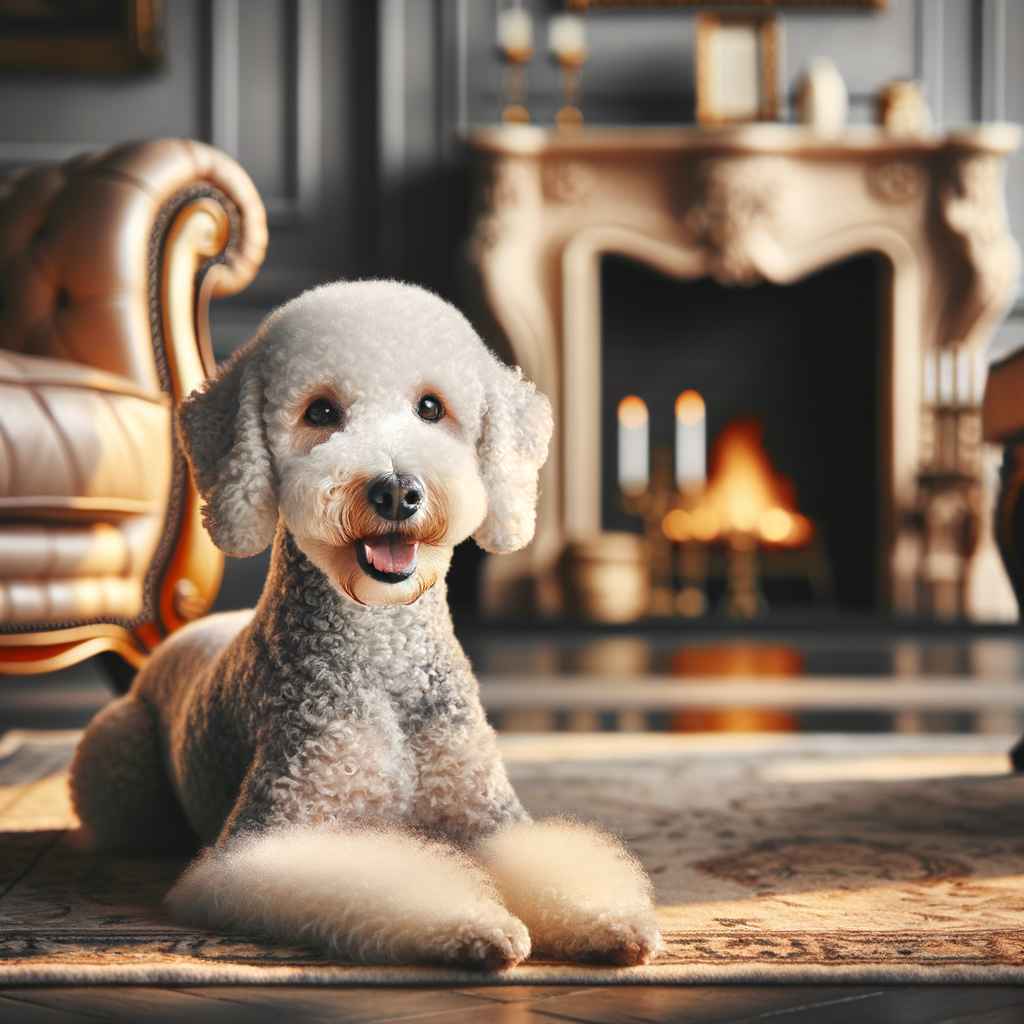
Recommended Dental Chews & Products For Bedlington Terrier
As a loving Bedlington Terrier parent, you might be tempted to reach for those flashy, commercially promoted dental chews. They promise to keep your pup’s teeth clean and breath fresh. But did you know they often fall short? Many of these products contain harmful ingredients and artificial flavors that can do more harm than good.
Even worse, many commercially promoted dental chews don’t effectively remove plaque and tartar. They’re often too soft to provide any real abrasive action. Plus, they can be a choking hazard if your dog tries to swallow large pieces.
Another product to avoid is drinking water additives. While they claim to improve your dog’s Bedlington Terrier Dental Health, these additives can actually harm the beneficial bacteria in your dog’s gut. They can disrupt your pet’s digestive system, leading to health problems.
Dr. Candy’s Recommended Dental Chews & Products
Now that we’ve talked about what not to use, let’s focus on the products that can truly benefit your Bedlington Terrier’s dental health. Dr. Candy recommends focusing on natural, single-source proteins such as tendons, raw marrow bones, and bully sticks.
Tendons
Tendons are a fantastic natural chew for your Bedlington Terrier. They are tough and fibrous, which helps to scrape off plaque and tartar from your dog’s teeth. Plus, they are a good source of protein and collagen, promoting good joint health.
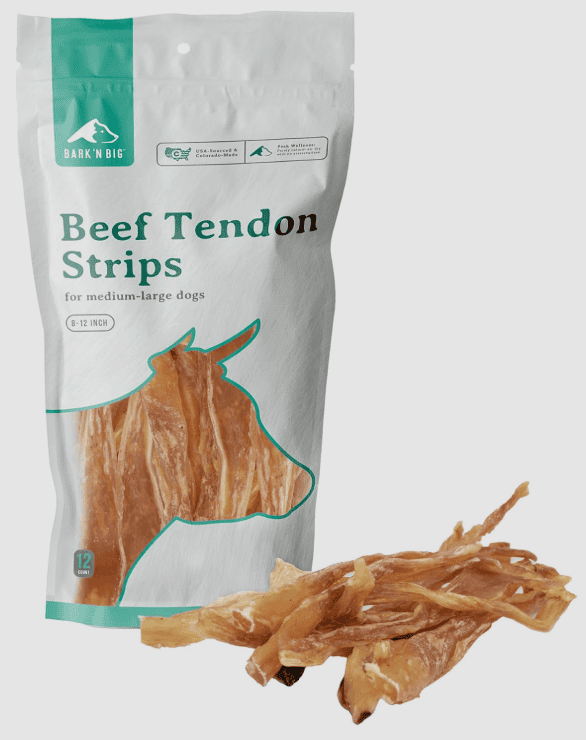
Raw Marrow Bones
Raw marrow bones are another excellent choice for maintaining your Bedlington Terrier’s dental health. They are a natural source of calcium and phosphorus, which are essential for healthy teeth and bones. Furthermore, the act of gnawing on bones can help to clean your dog’s teeth and gums.
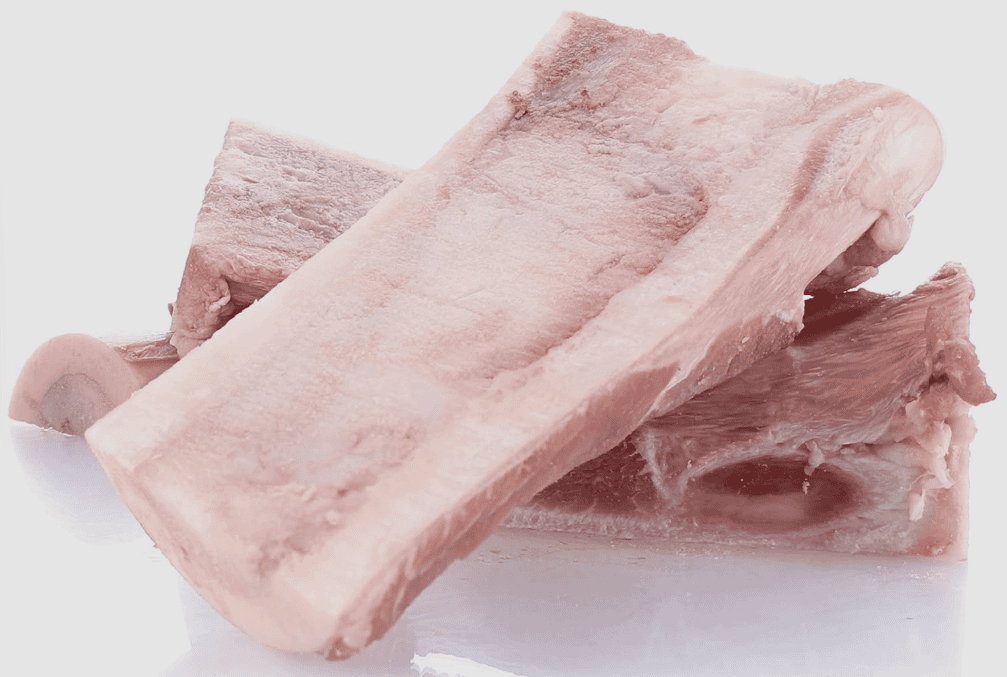
Bully Sticks
Bully sticks are made from 100% beef muscle, providing a natural and digestible chew for your dog. They can effectively remove plaque and tartar and are a good source of protein. However, always supervise your dog while they’re chewing on a bully stick to prevent any choking hazard.

Remember, no chew or product can replace regular tooth brushing and professional dental cleanings. But by incorporating these recommended products into your Bedlington Terrier’s dental health routine, you’re taking a positive step towards maintaining their oral hygiene. Always consult your vet before introducing any new food or product into your pet’s diet.
Frequently Asked Questions
1. How can I prevent bad breath in my Bedlington Terrier?
Regular brushing of your Bedlington Terrier’s teeth is the most effective way to prevent bad breath. Use a dog-specific toothbrush and toothpaste to clean their teeth at least 2-3 times a week. Additionally, providing dental chews or toys can help remove plaque and freshen their breath.
2. Are there any specific dental products recommended for Bedlington Terriers?
Bedlington Terriers may benefit from dental products that are designed specifically for their breed. Look for toothbrushes with smaller heads and softer bristles to accommodate their unique mouth shape. There are also dental sprays and water additives available that can help maintain oral hygiene.
3. What are some signs of dental problems in Bedlington Terriers?
Some common signs of dental problems in Bedlington Terriers include bad breath, yellow or brown discoloration on the teeth, swollen or bleeding gums, difficulty eating, pawing at the mouth, and excessive drooling. If you notice any of these signs, it is important to consult a veterinarian for a dental examination.
4. Can diet affect my Bedlington Terrier’s dental health?
Absolutely! Feeding your Bedlington Terrier a balanced diet that includes high-quality dog food can contribute to their overall dental health. Dry kibble can help remove plaque buildup, while avoiding sugary treats and table scraps can prevent tooth decay. Consult with your veterinarian for specific dietary recommendations.
5. How often should I take my Bedlington Terrier for professional dental cleanings?
Professional dental cleanings are typically recommended once a year for most dogs, including Bedlington Terriers. However, the frequency may vary depending on your dog’s individual dental health. Your veterinarian can assess their oral condition and provide guidance on the appropriate timing for professional cleanings.
